The key story in the 2017 Dutch election campaign so far has been the high levels of support for Geert Wilders’ PVV in opinion polls. But what explains the PVV’s ability to attract voters? James Dennison, Andrew Geddes and Teresa Talò write that although Wilders’ success is frequently linked to hardening views on immigration, attitudes toward immigration in the Netherlands have actually remained fairly stable. The real root of the PVV’s support lies in the salience of the immigration issue itself, partially heightened by media coverage of recent increases in the numbers of migrants entering the country.
2017 has been widely billed as a year of potentially momentous elections across Europe, including in Germany, France and, on 15 March, in the Netherlands. Some commentators have speculated about a domino effect that would see mainstream governments fall as part of a pan-Western backlash against globalisation and high levels of immigration following the British EU referendum and American presidential election of 2016. At first glance, the Dutch election supports this interpretation: polls suggest that the anti-immigration PVV – led by Geert Wilders – may win the most seats of any party in the House of Representatives. If Wilders’ party comes first, should we interpret the result as another example of surging public demand for an end to immigration? Or are such election results less indicative of a radical change in public attitudes than has thus far been assumed?
Figure 1 shows that immigration to the Netherlands and support for the PVV have risen in unison since 2011. This supports the observation that ‘ethnic change is historically associated with calls for immigration restrictions’. However, during this period we also see considerable volatility in PVV support, which was harmed in 2012 by the party’s role in the previous coalition government but then benefitted from the subsequent coalition between the centre-right VVD and centre-left PvdA.
The PVV enjoyed another boost in the wake of widely covered localised opposition to refugee settlement, an issue that has ebbed more recently though still sees half of Dutch people arguing that African migrants should be returned. Despite this volatility, the correlation between the PVV’s average annual polling and annual immigration to the Netherlands since 2011 is very strong (r = 0.85; p = 0.03; N = 6), suggestive that the PVV’s success is partially determined by actual immigration figures.
Figure 1: Immigration to the Netherlands and radical right support
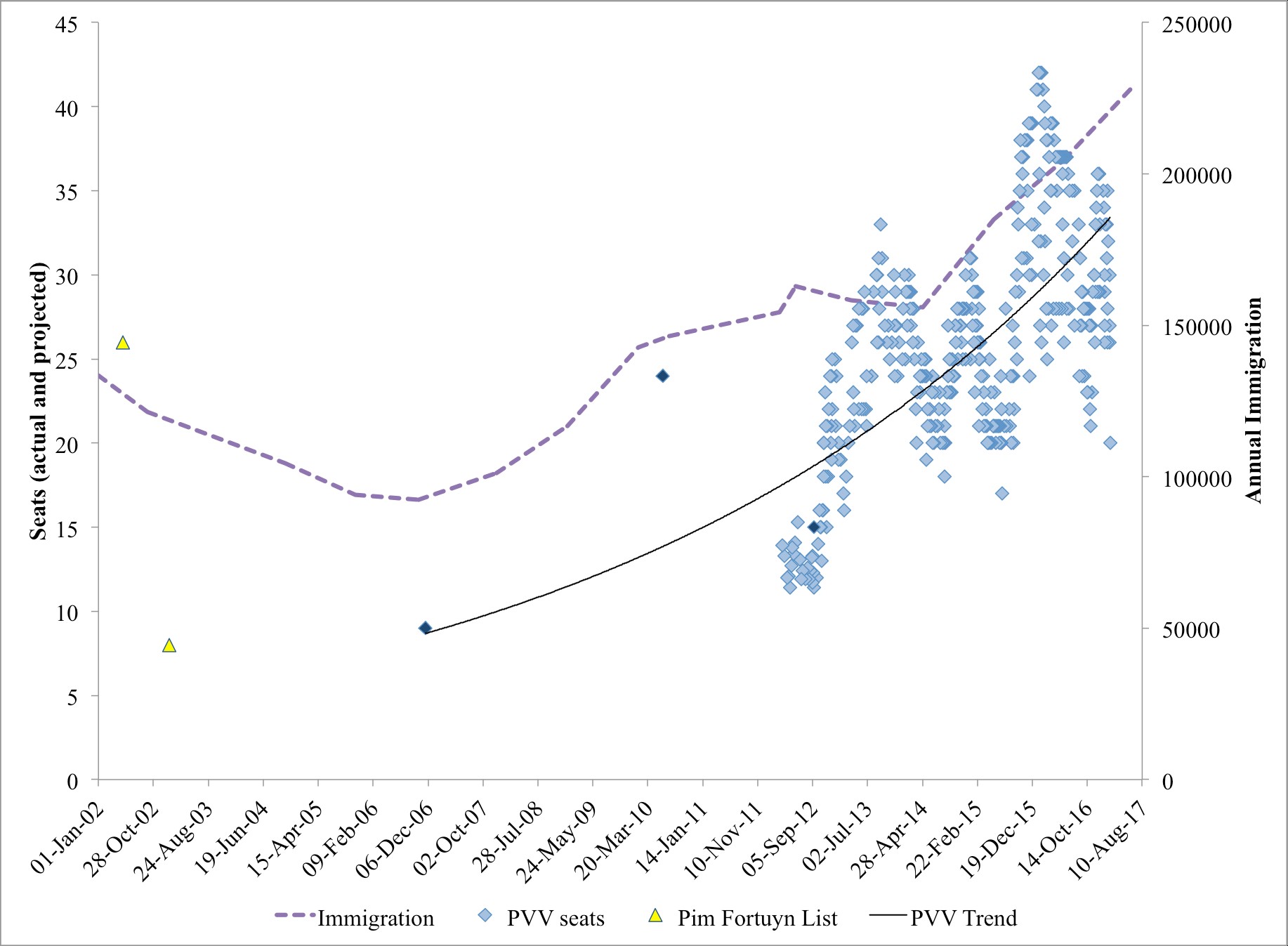
Source: CBS
Wilders claims that Islam is a ‘backward’ religion and that its followers are disproportionately sympathetic to values that threaten the Dutch way of life – with LGBT and women’s rights often cited as being particularly at risk. Focusing on Islam has been effective in the Netherlands given its history of immigration, from Indonesia and Suriname as well as Turkish and Moroccan labour immigrants. Dutch attitudes to these communities vary considerably: the primarily Christian Indonesian and Suriname communities are generally considered well integrated while Turks and, to a greater extent, Moroccans are regularly decried for their higher crime rates, weaker economic performance and supposedly languid integration efforts. From 2004 onwards, the Netherlands has experienced two further new waves of immigration – first from Poland and, in the last few years, from non-European conflict zones, with 64,000 Syrians officially residing in the country as of September last year.
Attempts by Wilders to make political capital out of anti-Polish stances – notably via the creation of a website to report crimes by Eastern Europeans – have been less successful than his anti-Islamic and anti-Syrian rhetoric, which finds a sympathetic audience amongst the 50% of Netherlanders who see non-Western migrants as a threat to their way of life.
Indeed, attitudes towards immigration have a distinct bent in the Netherlands because of its strong socially liberal self-identity. The Netherlands, along with the Nordics, is generally among the most open of European countries. The Dutch seem to be less concerned than their European counterparts with migrants’ ethnicity, skills and qualifications. However, there is a notable exception over their concern with safeguarding a liberal, tolerant lifestyle (Figure 2). They are among the top five European countries in demanding that immigrants learn the native language and adopt Dutch customs.
Figure 2: ‘How important is it that immigrants have the following traits?’
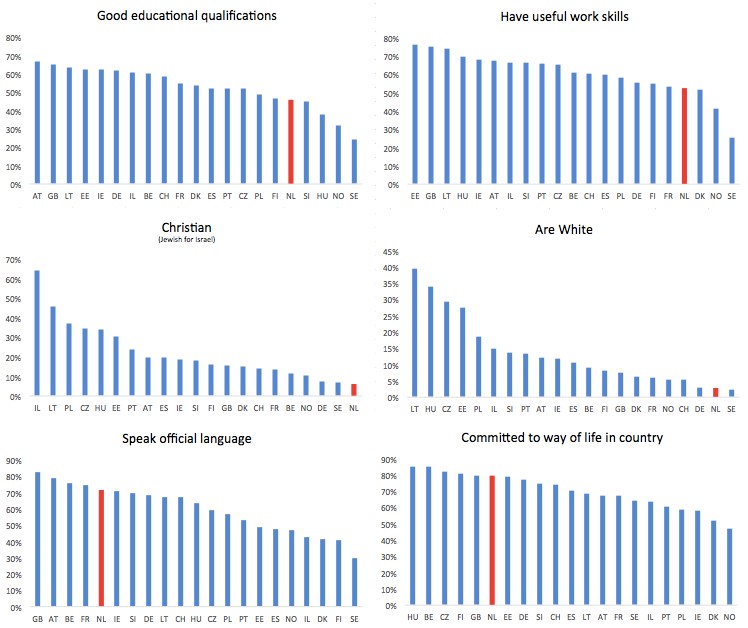
Source: ESS 2014
Wilders’ uncompromising stance has allowed him to garner the votes of citizens with anti-immigration and anti-Islamic attitudes and make the PVV the obvious anti-immigration choice when the immigration issue is salient. Prior to the 2012 election – dominated by a close, economics-driven race between the VVD and PvdA – he could only watch from the sidelines as the PVV parliamentary representation was cut by a third. Today, the vast majority of those Dutch voters who plan to back the PVV see immigration and asylum as a motivation for their party choice (Figure 3). However, between June and December of 2016, the proportion of the population giving immigration and asylum as a basis for their planned vote declined notably from 41% to 33%, despite over 80% expressing some concern over immigration. At the same time, Wilders has suffered in the opinion polls.
Figure 3: Motivations for party choice: percentage responding ‘immigration and asylum’
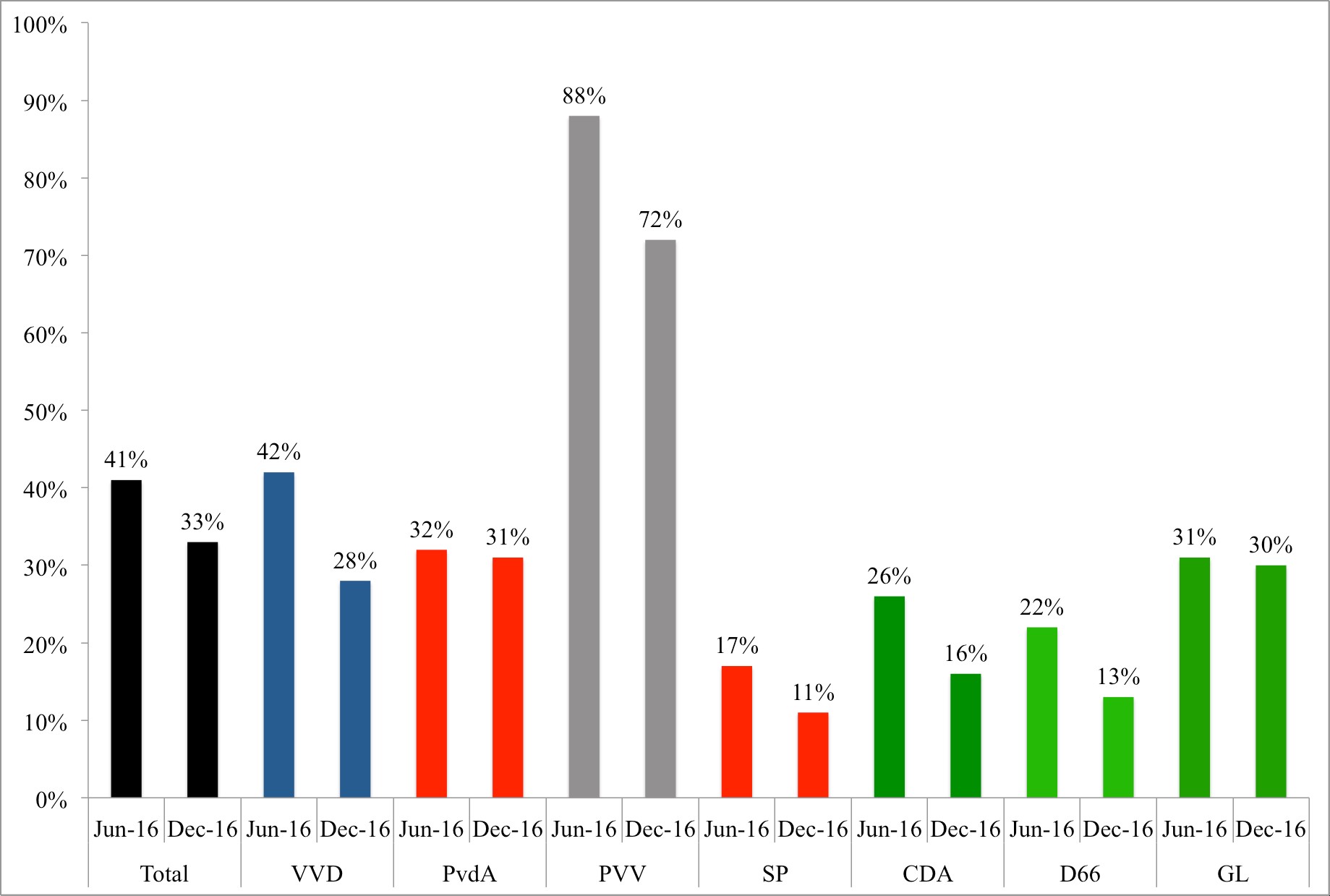
Source: I&O Research
More broadly, in the Netherlands and all but one other Western European country, average attitudes to immigration are fairly stable and have actually become more positive throughout the 21st century (Figure 4).
Figure 4: Mean evaluation of whether immigrants make the country a better or worse place to live in in 2002 and 2014 (scale from 0 = worse to 10 = better)
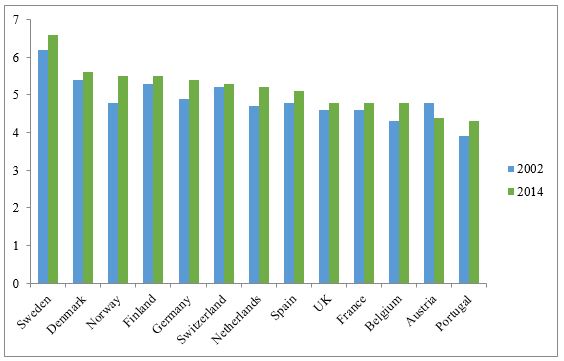
Source: ESS 2002 and ESS 2014
The gradually more pro-immigration attitudes of Europeans stand in contrast to the rapid rise of populist radical right parties in some European countries that has coincided with two large waves of immigration. This suggests that attitudes towards immigration at the aggregate level are not necessarily related to the number of immigrants. Instead, anti-immigration attitudes are fairly fixed and latent in social conservatives (majorities of CDA, PVV and 50Plus voters – like PVV voters – feel the advent of non-Western immigrants is a threat to Dutch values).
These attitudes are however activated and motivate party choice when the issue is made salient such as in times of high immigration levels. As such, high immigration has indeed led to the rise of anti-immigration parties in the likes of the Netherlands, France and Britain, not by turning natives against immigration but by increasing the salience of the topic amongst those who already view socio-demographic change as a risk to the national social order.
These individuals are disproportionately found amongst lower socio-economic groups who tend towards having social conservative and left-wing economic attitudes, both of which call for order and eschew ambivalence and uncertainty. Indeed, the most relevant socio-economic variable in determining sympathy to immigration is having a university education, which tends to act as a liberalising socialisation experience. The argument that anti-immigration attitudes are latent and interlinked with other ideological outlooks conforms to the often-repeated observation that regional immigration levels have no or a negative correlation with regional immigration attitudes, a finding repeated in Figure 5.
Figure 5: Non-EU population and attitudes to immigration by region
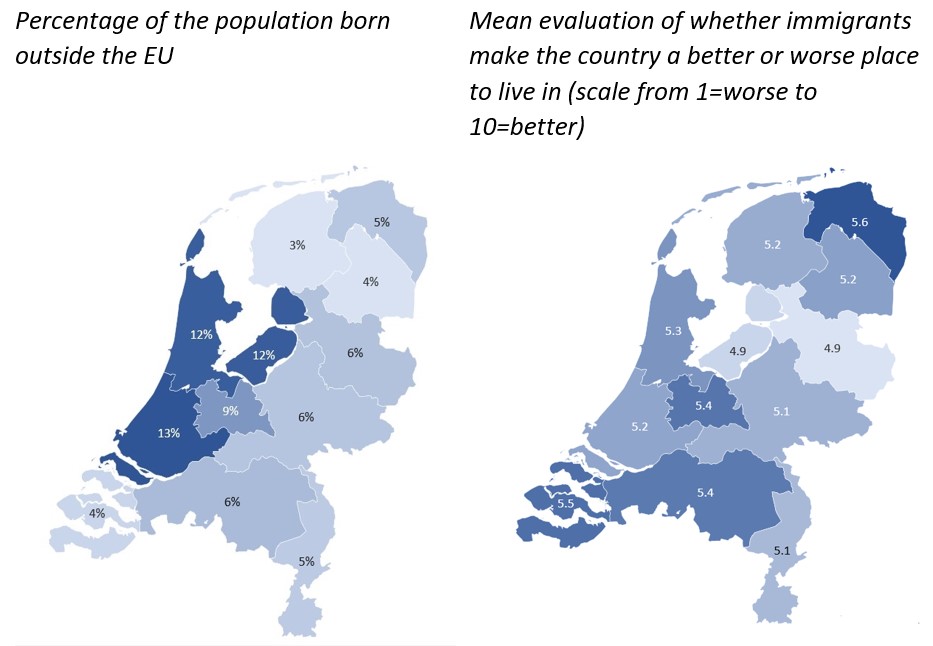
Source: Eurostat Census 2011; ESS 2014; foreign-born respondents are excluded from the computation of averages
The Dutch election shows the nuanced relationship between immigration rates, immigration attitudes, and variance in the support of populist radical right parties. Higher immigration rates seem to go hand in hand with the recent surge in support for the PVV. However, attitudes towards immigration are fairly stable in the general population. Salience plays a key role in explaining the PVV’s rising performance in the polls: immigration’s salience rises along with actual waves of immigration and their coverage in the media.
In turn, higher salience mobilises citizens that hold anti-immigration stances to vote for radical right populist parties such as the PVV. In this case, the potential level of support for parties like the PVV (which currently polls at around 25 seats) is likely to be limited. Just as anti-immigration attitudes were a necessary but insufficient factor in explaining both Brexit and the election of Donald Trump, anti-immigration sentiment alone will not be enough to make the Dutch, French and German governments ‘fall like dominos’ in 2017.
Please read our comments policy before commenting.
Note: This article gives the views of the authors, and not the position of EUROPP – European Politics and Policy, nor of the London School of Economics. Corrections: 1) The article previously erroneously stated that 200,000 Syrians entered the Netherlands in 2015. The figure in fact referred to the total number of migrants. 2) Polling figures refer to seats, not percentages.
_________________________________
 James Dennison – European University Institute
James Dennison – European University Institute
James Dennison is a Research Fellow at the Migration Policy Centre at the European University Institute. He is the author of The Greens in British Politics (Palgrave, 2017) and tweets @JamesRDennison
 Andrew Geddes – European University Institute
Andrew Geddes – European University Institute
Andrew Geddes is Director of the Migration Policy Centre at the European University Institute and co-author (with Peter Scholten) of The Politics of Migration and Immigration in Europe (Sage, 2016). He tweets @AndrewPGeddes
 Teresa Talò – European University Institute
Teresa Talò – European University Institute
Teresa Talò is Lead Analyst at the Migration Policy Centre based at the European University Institute. Her work looks at populist voting, attitudes on migration, and irregular migration to the EU. She tweets @TeresaTalo



It will be interesting to see just how wrong (or right) the content of this article actually is.
Either way there are enough EU citizens who have had enough of being lied to and having to suffer the impact of policies with which they disagree, to change things for the better across the EU.
The proportion of people in the Netherlands that consider it important that an immigrant be white or Christian is 5%, while the PVV is at ~25% in the polls. On this basis, it would be reasonable to conclude that when the PVV says they don’t judge on skin colour but on commitment to the Dutch way of life, that they are telling the truth. In fact, it would be unreasonable to conclude the opposite.
Nice to see some hard data on it, good work.
The headline is a tortuous, not to say misleading summary of the findings. To claim it is not the increase in immigration or the increase in hostility to it that is driving support for the PVV, but the “salience” of the issue, while admitting this salience is a product of the increase in immigration, is tortured logic. To claim Dutch attitudes to immigration have been stable (for how long?), but just by chance they are suddenly leading people to vote massively for an anti-immigration party is to strain credulity. This is an exercise in downgrading the significance of the growing resistance to immigration, especially from non-European countries, by a succession of logical quibbles interpreting the data. I don’t think it will convince many people.
Good piece that delves well into the data (despite the headline). However as with much coverage of the Dutch election there is an overplay of Wilders’ role – PVV are on about 15% of voting intentions and have fallen into second place with most opinion pollsters. It is interesting to see the centre-right VVD making a recovery after toughening up their rhetoric on immigration and integration, but at the same time other parties with a more relaxed attitude to immigration are going well in the polls (eg Green Left).
I have not read such a pro-Islamic article for many a year as written by the authors of this piece.
The tide is rapidly turning against Islam in Europe with the expected summer flood of migrants
pouring in from Africa and the Middle East at great personal via the Med.
Due to Merkel’s folly, all European States are looking to reinstate hard borders and many may
not be coerced by Brussels diktats on Migrant quotas that they must accept when instructed.
Many do not wish to see their Towns and Villages taken over by aliens from other continents
who emanate from various Tribal Societies and cannot be democratized or properly integrated
into a mainly Judeo-Christian Society, period.
The rate of migrants seeking to settle in Europe is out of control, unchecked, and can only provoke
mass civil unrest and public disorder.
On the ‘hard borders’ mentioned earlier, difficulty in holding back the determined thousands who consider it their right to be resettled in Europe and share in its wealth, I can foresee ‘lethal’ force being used as a
last resort to stem the flow.
The UK of course, will not be part of the Brussels quota system and can watch Merkel’s Islamisation
of Europe unravel, with the relief that it got out of the EU in the nick of time.
As the predicted domino effect ensues.
The EU gravy train has well and truly hit the buffers, as the proverbial shiite hits the fan.
“The UK of course, will not be part of the Brussels quota system and can watch Merkel’s Islamisation
of Europe unravel, with the relief that it got out of the EU in the nick of time.”
We weren’t part of the quota system while members of the EU so the idea Brexit has “saved” us from the quota system is just gibberish.
One of many Press disclosures from January 2016:
“‘The floodgates would open’: Fury over EU plans to make Britain accept 90,000 refugees a year as part of migrant quota ‘that would make Calais even more of a magnet’
“There has been widespread fury at the plans from Brussels, but a failure to agree a quota could see the UK denied the right to deport asylum seekers to their country of arrival”
” European Commission wants a new quota system to deal with refugees
Member states would share 1.3m people expected to arrive in EU in 2016
Britain, which would take 90,000, has been warned if it refuses it will lose right to send home migrants who should have made their claims elsewhere
Judge last night approved giving four young Syrian men asylum in UK ”
@ Burns: Choosing to turn a blind eye to reality will not stop the UK leaving a German-controlled Europe Union and its mainland Euroflock kowtowers.
European Culture being swamped by tribes from other Continents can have only one outcome.
If you are resident on mainland Europe, it may be wise to find your tree to hug before they are
all taken, and squeeze it good and tight, avoiding gibbering at all costs.
If you are resident in the UK, give thanks to the 52% making Britain great again
They recognise that if the UK was foolish enough to remain a member of the EU it would have been forced to comply with an endless Brussels quota, from the control freak, the good ship
Deutscher Bundestag and all who sail in her.
‘Ein Prosit’
Jomsingal thanks for parrotting the Daily Mal and Express cover titles. Should I also add the Sun, Times and Telegraph in the mix of lying gutter press ?
not only have those papers been found guilty of misreporting by their sham “regulator” IPSO, they are also considered as too inaccurate to be used as reference quotation (Express, Mail and Sun by Wikipedia)
Jonsimgal: We agreed an opt out from the quota system in May 2016. Maybe try reading a little about the subject first before debating it?
If we really have to paste newspaper articles to establish basic facts then here you go: https://www.ft.com/content/3282746e-11d8-11e6-839f-2922947098f0
“May 4 2016 — Boost for Cameron as UK wins exemption from new EU asylum rules
Under plans announced on Wednesday by the European Commission to overhaul Europe’s much-criticised rules on asylum seekers, most EU countries would be required to participate in a new quota system that would force them to accept migrants if a front-line state becomes overwhelmed, as Italy and Greece were at the height of the refugee crisis. Failure to comply would result in fines of €250,000 per person.
But in a boost for David Cameron, prime minister, Britain would be allowed to opt out of the quota system and continue with current rules that allow for expulsions.
“Nothing will be forced on the UK . . . If it wants to continue on the existing system it can,” Frans Timmermans, commission vice-president, said in Brussels as he unveiled the first serious attempts to rewrite the existing “Dublin system” agreed two decades ago.”
“…Dutch attitudes to these communities vary considerably: the primarily Christian Indonesian and Suriname communities are generally considered well integrated while Turks and, to a greater extent, Moroccans are regularly decried for their higher crime rates, weaker economic performance and supposedly languid integration efforts”
Do Moroccans have a higher crime rate? Are they more likely on state aid? Why? Why import problems when, I’m sure, the Dutch have a lot of home grown types like these.
Please don’t hurt indians please iam begging you people’s(netherlands peoples)